Each month, MBU’s new wellness navigator Christine Flory will share events, insights, and strategies on a variety of health-related topics with faculty and staff.
Christine brings nearly 20 years of experience working in the wellness industry to MBU, and is an ACSM-certified personal trainer and nationally board-certified health and wellness coach. To read more about her, please click here, and scroll down for this month’s health and wellness opportunities.

Upcoming Wellness Events
Anthem Eap Webinar: Digital Health
Unplugged: Digital Detoxing
Available on demand starting July 19: Find the reasons why we need to do a digital detox and learn practical steps on how to start incorporating it into your schedule.
To view a seminar on demand, go to anthemeap.com and enter your company code: MBU. You’ll find a link to these and other seminars on the homepage.
Dimensions of Wellness
Developed by Dr. Bill Hettler, co-founder of the National Wellness Institute (NWI), this interdependent model, commonly referred to as the Six Dimensions of Wellness, provides the categories from which NWI derives its resources and services
It is important to take a holistic approach to our wellness. We are more than just a number. There are six dimensions of wellness: emotional, occupational, physical, social, intellectual, and spiritual.
Each month, over the next six months, I will break down each dimension.
By applying the six-dimensional model, a person becomes aware of the interconnectedness of each dimension and how they contribute to healthy living. This holistic model explains:
- How a person contributes to their environment and community, and how to build better living spaces and social networks
- The enrichment of life through work, and its interconnectedness to living and playing
- The development of belief systems, values, and creating a world-view
- The benefits of regular physical activity, healthy eating habits, strength and vitality as well as personal responsibility, self-care and when to seek medical attention
- Self-esteem, self-control, and determination as a sense of direction
- Creative and stimulating mental activities, and sharing your gifts with others
The first dimension I’d like to talk about is emotional wellness.
Emotional Wellness
Emotional wellness emphasizes an awareness and acceptance of one’s feelings. It includes the ability to effectively cope with the challenges life throws at you while building satisfying relationships with others. It implies an optimistic approach to life despite its occasional disappointments and frustrations.
Enhancing emotional wellness
Emotional health can be maintained by engaging in regular leisure and recreational activities. Practice being self-aware and accepting of personal strengths and weaknesses.
Signs of Emotional Wellness
- Enjoys life and has a positive outlook
- Spends time with friends and family
- Participates in self-esteem workshops and reads self-help books
- Recognizes need for support and reaches out for it
- Aware of and accepting of own feelings
- Resilient and sets priorities
- Keep expectations of yourself and others realistic
How to achieve emotional wellness
- Practice positivity
- Make building meaningful relationships a priority
- Take advantage of resources for enhancing self-esteem and growth
- Access resources in a timely manner
- Practice awareness of feelings
- Learn to be confident even during stressful times
Emotional wellness follows these tenets:
- It is better to be aware of and accept our feelings than to deny them.
- It is better to be optimistic in our approach to life than pessimistic.
Assessing your emotional wellness:
Do the following statements ring true or false to you?
- I practice positive thinking.
- I take responsibility for my actions.
- I am able to laugh at life and myself.
- I am able to develop and maintain close relationships.
- I feel good about myself.
- I am able to recognize and express my feelings while being respectful of others.
- I am able to effectively cope with stress and tension.
- I make time for leisure pursuits.
- I feel I have considerable control over my life.
- I recognize my personal shortcomings and learn from my mistakes.
If you answered “false” to any of the above, it may indicate an area where you need to improve the state of your emotional wellness.
Resources for attaining and enhancing emotional wellness:
- Counseling services
- Yoga and mindfulness practices
- Anthem EAP services
- WebMD programs
Resources: nationalwellness.org

Contact Christine
- Email cmflory@marybaldwin.edu
- Call 540-887-7167
- Stop by her office in SAC 301